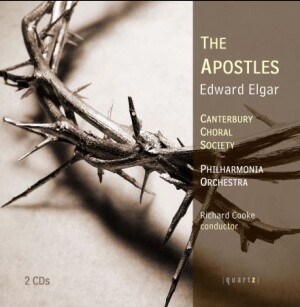|
|
World music CD DVD shop and Classic distribution
|
|
|
|
ID: QTZ2017 (EAN: 880040201724) | 2 CD | DDD Publi: 2005
- LABEL:
- Quartz Records
- Subcollection:
- Voices and Orchestra
- Compositeurs:
- ELGAR, Edward
-
Interprètes:
- CAMPBELL, Colin (baritone / baritone) | LEESE, Anna (soprano) | POOLE, Louise (mezzo-soprano) | RICE, Robert (baritone) | STAPLES, Andrew (tenor) | WILLIAMS, Roderick (baritone / baritone)
- Orchestre
- Canterbury Cathedral Choristers | Canterbury Choral Society | Girls of the Crypt and Chamber Choirs of the King's School, Canterbury | Philharmonia Orchestra
- Chef d'orchestre:
- COOKE, Richard | FLOOD, David
- Pour plus amples dtails:
Anna Leese - soprano (Mary)
Louise Poole - mezzo-soprano (Mary Magdalene)
Andrew Staples - tenor (John)
Colin Campbell - baritone (Peter)
Robert Rice - baritone (Judas)
Roderick Williams - baritone (Jesus)
The years 1898-1900 for Elgar saw the composition of The Dream of Gerontius which represented a new style of oratorio in which a continuous musical flow replaced the customary division into separate arias and choruses.
He embarked seriously on The Apostles in 1902 and the first performance took place in October of the following year at the Birmingham Festival conducted by Hans Richter. Elgar himself conducted performances in 1914 and again in 1922 in Canterbury Cathedral where this performance was given. As with Handel's Messiah Elgar's work was to have been in three parts, though it soon became apparent that it was going to be far too long for one oratorio, and the third part became the starting point for The Kingdom. This piece grew in its turn and the project became one for three oratorios; the first The Apostles, concerned with the apostles' relationship with the earthly Jesus, the second, The Kingdom, with the period after the crucifixion and the coming of the Holy Ghost, and the third, which never came to be written, on Judgment and the Life Everlasting.
Another influence is to be found in Wagner who built up his scores from a pattern of leit-motifs. In his analysis of The Apostles, Jaeger identified and named about sixty such themes, though he came under criticism from Ernest Newman (a leading Wagner authority) for being too obsessional in this respect, and even Elgar himself felt that Jaeger had taken this aspect of the work further than was really justified, since the themes, while being a strong structural element in the music, lacked the immediately identifiable symbolism of Wagner's motifs. The two composers' compositional methods were very different: Wagner completed his libretto first, allocating fragments of melody to particular ideas and incorporating them into the score at significant moments, for Elgar the musical development was pre-eminent he was by nature a symphonic, rather than an operatic composer.
CD 1
|
| ELGAR, Edward (1857-1934) | | | The Apostles | | | 1. | Prologue | 7:09 | | | 2. | 1. The Calling of the Apostles | 0:44 | | | 3. | 1. In the Mountain - Night | 6:28 | | | 4. | 1. The Dawn | 1:27 | | | 5. | 1. Morning Psalm | 11:12 | | | 6. | 2. By the Wayside | 7:17 | | | 7. | 3. By the Sea of Galilee | 1:25 | | | 8. | 3. In the Tower of Magdala | 13:31 | | | 9. | 3. In Caesarea Philippi | 15:13 | |
CD 2
|
| 1. | Introduction | 3:25 | | | 2. | 4. The Betrayal | 4:53 | | | 3. | 4. In Gethsemane | 4:41 | | | 4. | 4. The Temple | 3:24 | | | 5. | 4. Without the Temple | 8:16 | | | 6. | 5. Golgotha | 3:35 | | | 7. | 6. At the Sepulchre | 3:47 | | | 8. | 7. The Ascension | 4:14 | | | 9. | 7. In Heaven - On Earth | 10:19 | |
|
|

